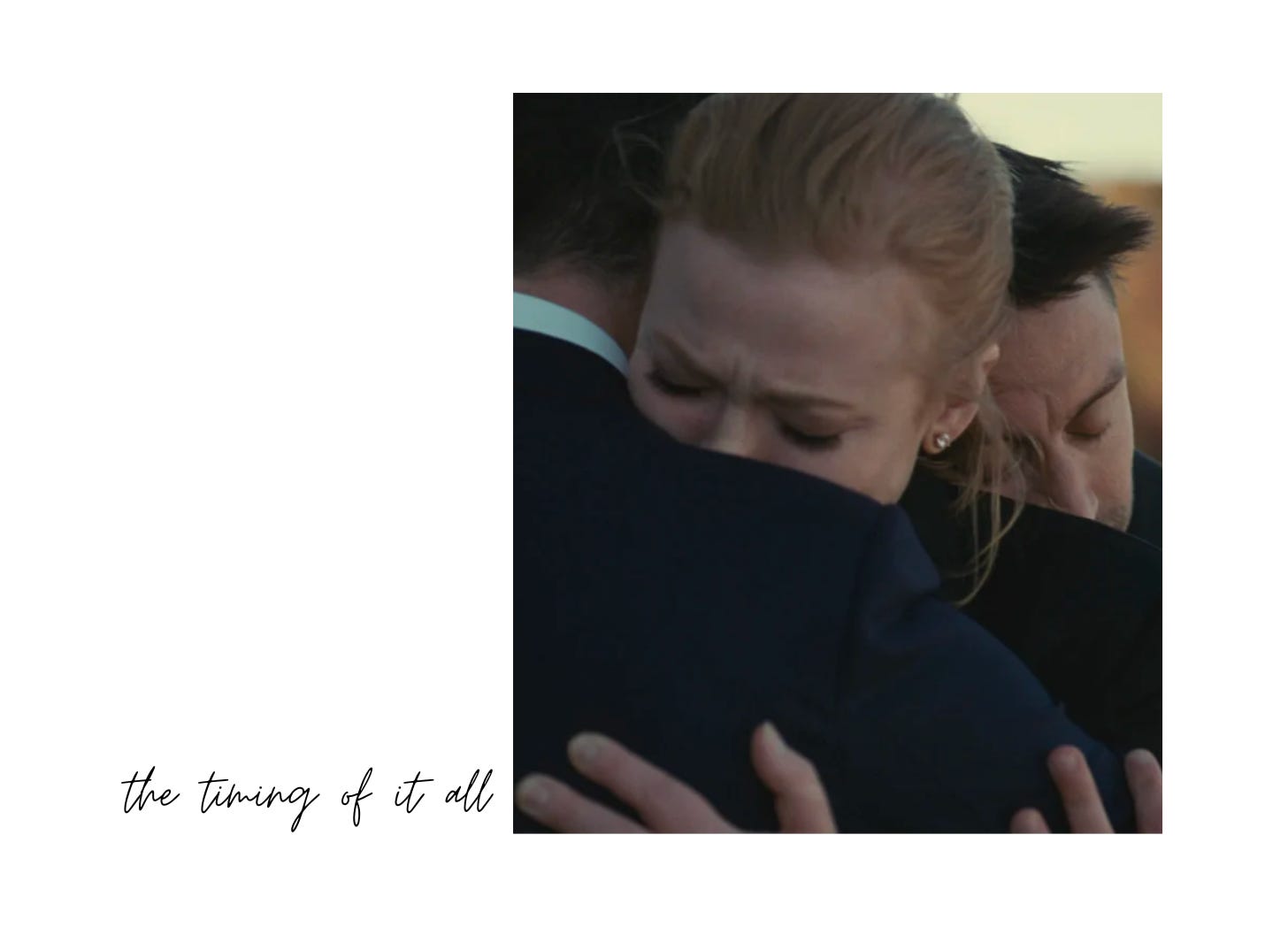I’ll take any chance to speak of Succession. It’s a show full of unlikeable characters that are morally grey (if not just unredeemable), with an understated production where dialogue drives the action and not the other around. It’s continuously ability to capture not just the attention of the audience but also the online discourse amazes me because, if we are being honest, our attention spans are so in the shits that it would be easy for this to go under the radar.
Those of the many of us that do watch the show collectively went through one of the best episodes on tv ever. We all knew Logan could die. We knew! And yet the gut punch that it was when it actually happened. The way it happens on the third episode, with no foreshadowing and off screen leaving us and the characters uncertain that it actually did happen… it’s the stuff of genius. It shows a mastery of not just dramaturgy - thanks, Jeremy Strong, for the vocabulary - but of their audience.
The weight of it is felt from the characters' responding to the event and not the event herself. The almost continuous shot giving us no interval from the raw emotions and confusion of these siblings as they process in real time the complicated relationship they have with their father as it comes to a halt.They too knew this could happen and they too forgot the possibility until it was undeniable.
We could go on about the brilliance of what they have achieved. But I’d like to focus on the timing of it all. To kill such a central character before even reaching the middle of its last season can be a risk, but it paid off. Not just because it propels the narrative towards the actual succession instead of tiptoeing around it, but because it made the show the talk of the town for the past week.
Why does online discourse matter? Because in a world where attention spans are the length of a TikTok, dominating the online discourse and making your show an integral part of it, will make it so everyone wants to watch it out of fear of not being able to participate in the space they spend most their time in.
If you want to appeal to a wider audience, you want to be a part of the conversation. Hell, you have to be a part of it. To put it simply: give people FOMO for your show and watch the audience numbers climb up as a group of people start watching for fear of being left out of the commentary going on their Twitter feed or for you page on Tiktok.
The death of Logan Roy on the third episode serves this effect because of the show’s weekly release schedule. If three weeks ago HBO had released the entire season we’d have talked about it for a week and by now moved on, this death would’ve gone under the radar along with its significance plot wise. It would be but a crumb on the online discourse and its return would reflect that.
The binge model worked while it was a novelty. For years, if not decades, we were educated to consume one episode a week and suddenly we were getting an entire season all at once. It made us ravenous in the constant demand for more. And ultimately it’s impossible to keep up with that demand. And so, Netflix created its own downfall.
When this was new they had a catalog of content ready to be handed to us, but they burn through that to try and keep us happy. Now new shows either are an instant success number wise or they get canceled after a season or two and without ever completing their arcs in a way that is satisfying to their audiences. The rule seems to be: you either appeal to a wide audience instantly or you are doomed.
Certain shows have created niche audiences that are extremely devoted to their narratives, but that means little to Netflix when all they want is massive numbers. And you can’t effectively do that if you just force feed us entire seasons.
Producing a good show is not an easy feat and one that can’t be rushed unless you are willing to forgo quality. While we wait for new seasons of past success we are being given season after season of content that’s easier to produce but less significant.
Look I’ll be the first to binge Love is Blind, but it’s not going to stick with me like Succession’s season 3 finale. Or the Battle of The Bastards episode of Game of Thrones. Or the Last of Us’ third episode or season finale. It is good for a short time, not a long time.
The new tactic of making half the season available at a time seems like an attempt to get closer to the weekly model without actually committing to it. Netflix rested their entire unique selling point on something that wasn’t viable long term.
They are trying to combat it by raising subscription costs, coming up rules that make sharing the account impossible/more difficult and getting rid of any content that isn’t an immediate success because they can’t sustain themselves for longer. As the quality of the content keeps decreasing the harder it’s going to be to retain subscribers.
Killing Logan Roy in the third episode proves us that the timing of it all is not just important, but crucial. It opened a world of possibilities for the show in its last season. It is a case study of an episode for its writing and how they executed it technically. And it seems to be the definitive argument for a weekly release schedule.
So while Netflix sets off to another season of marrying couples sight unseen, HBO’s wedding episodes keep raising the stakes for what is done on television… it is hard to miss the poetry in this contrast.



